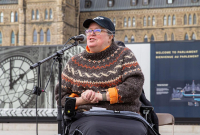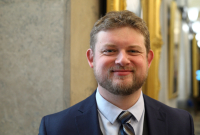Support strong Canadian climate journalism for 2025
The Quebec government is welcoming a federal government move to send most of the asylum seekers who enter Canada through an irregular crossing in southern Quebec outside the province.
A spokesman for Quebec Immigration Minister Christine Fréchette said Wednesday that of the 125 migrants who entered Canada at the Roxham Road crossing on Monday, 102 were transferred out of the province. Fréchette had revealed on Tuesday that all but eight of the roughly 380 asylum seekers who entered at Roxham Road on Saturday and Sunday were sent to other provinces.
"We hope this will continue," Alexandre Lahaie, the spokesman, said in an interview. He said community organizations in Quebec are under too much pressure to deal with the influx of migrants, adding that it now appears the federal government "understands the need to act."
In Ottawa, Heritage Minister Pablo Rodriguez, Prime Minister Justin Trudeau's Quebec lieutenant, said negotiations are ongoing with other provinces to redirect migrants entering Quebec.
"We recognize that Quebec has done more than its share, and we thank the government of Quebec for that. In fact, we are in discussion with other provinces to lighten the burden on Quebec," Rodriguez told reporters Wednesday. He noted that some other provinces are in need of workers.
"There's nobody who's going to be pushed or anything. It's done on a voluntary basis. But we recognize that Quebec's effort here is colossal, and we've been there to support it since the beginning," he said.
A federal government official speaking on background said the government has been moving migrants entering Quebec to other provinces since the summer.
Federal government statistics show that 39,171 asylum seekers were intercepted by the RCMP on Quebec's southern border in 2022, up from 4,095 in 2021. They accounted for more than 99 per cent of all asylum seekers who crossed the Canadian border irregularly in 2022. In total, around 60 per cent of all people claiming asylum in Canada in 2022 arrived through Quebec.
Quebec's Coalition Avenir Québec government has frequently called for Roxham Road, where the far majority of irregular crossings are made, to be closed. After it came out last week that New York City was buying migrants bus tickets to Plattsburgh, N.Y., a short drive from Roxham Road, the Bloc Québécois posted an ad on social media saying the province was not a free "all-inclusive" resort.
Quebec Premier François Legault called on Trudeau on Wednesday to discourage the migrants who have been using Roxham Road from coming to Canada. He told reporters in Quebec City he thinks many people are claiming asylum in Canada because of a 2017 Trudeau tweet saying the country would welcome people fleeing persecution.
"It's about time that Justin Trudeau makes a new tweet to say, 'Don't come anymore,' because we've exceeded our welcoming capacity," he said. He added that Quebec faces a shortage of housing and its schools and hospitals cannot handle the newcomers.
Cornwall, Ont., which is about 40 kilometres west of the Quebec boundary, began receiving many of the overflow migrants last year. "Months ago, the Liberals signed contracts with local hotels for a major Roxham Road processing centre, but local partners on the ground received zero notice, consultation or resources," Eric Duncan, the Conservative MP for the area, said in the House of Commons on Friday.
Sonia Behilil, the director of operations at a Cornwall organization that helps new arrivals, said the federal government began housing irregular asylum seekers at a local hotel last summer, and demand for her group's services exploded.
She said her organization, the Association canadienne-française de l'Ontario, de Stormont, Dundas et Glengarry, started to see around 20 people a day looking for help — up from just two or three.
"People had no idea where they were, some of them were thinking they were in Toronto, some people had no idea what they were supposed to do," she said. Some thought they needed to wait in the Cornwall area until their appointment with federal immigration officials — even though that appointment might take two years.
While funding for the program ended in January, she said the organization is still supporting migrants, including by offering free winter clothing.
Behilil said last week, during a winter storm, her organization gave winter clothes to a man who was just wearing beach shoes and a T-shirt.
Immigration, Refugees and Citizenship Canada did not immediately respond to a request for comment on Wednesday.
This report by The Canadian Press was first published Feb. 15, 2023.
— With files from Dylan Robertson in Ottawa




Comments